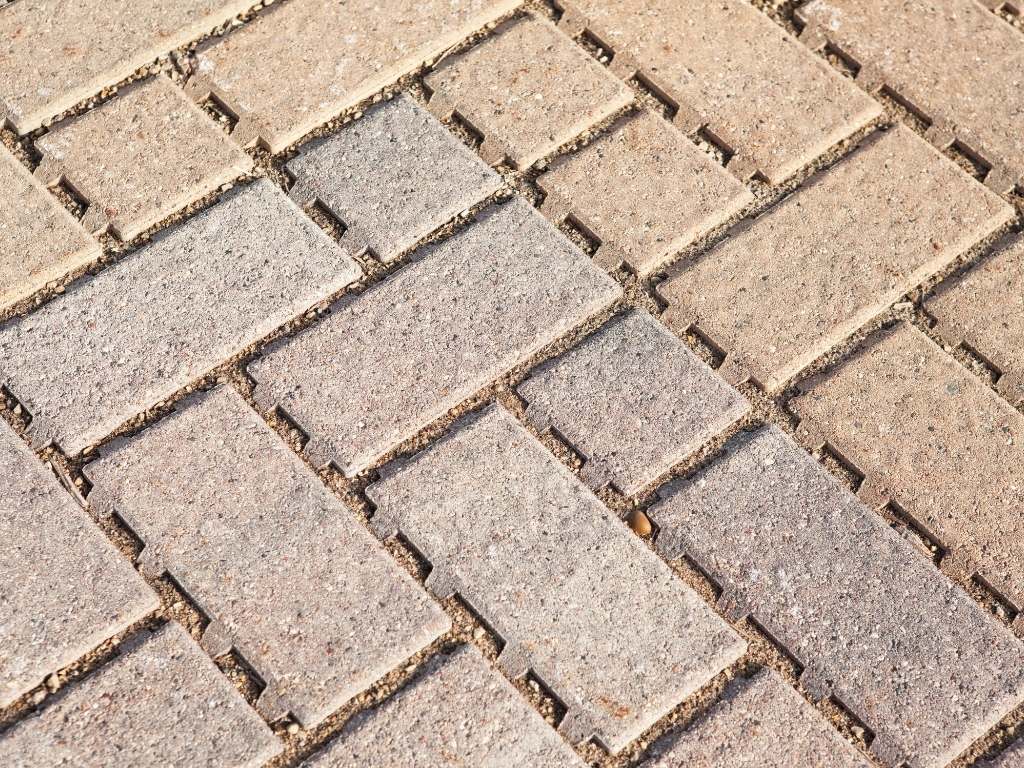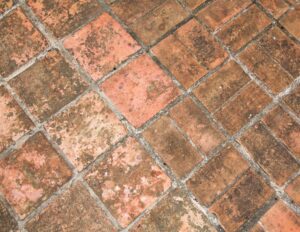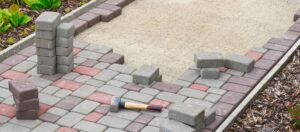When there is a concrete or an asphalt surface, water is incapable of soaking back into the ground and the disruption of water’s natural cycle can cause a lot of problems, from environmental issues to floods. Fortunately, there are types of brick pavers that allow water to soak back into the ground.
Nevertheless, to answer your question “Are brick permeable?” we need to mention that the brick itself is not permeable. The permeability comes from the paving method that allows the water to go around the material.
In this article, you are going to know everything you need about the permeability of bricks, permeable pavers, the advantages of using them, and how they work differently from regular pavers.

Jump to:
Are bricks permeable?
First, bricks are not exactly permeable. The rainwater or runoff does not filter through the bricks. Instead, when you lay out a system of permeable pavement they have gaps between them that allow water to pass through to the layers underneath.
These types of pavers are usually made from clay brick or concrete. These blocks can bring unique patterns and color to your pavement.
Permeable pavers are very popular in areas that have a high volume of rain and where local governments are more worried about stormwater management to avoid floods and other issues.
What are pavers and what they are made of?
Pavers are flat construction units made of stones, bricks, or concrete used normally as exterior flooring. Pavers are the go-to choice when it comes to creating exterior areas, such as driveways, walkways, patios, and pool decks. But, some types of pavers available in the market today are impermeable and that means that the water can’t penetrate the soil and it can be a problem for many reasons.
Fortunately, there are permeable pavers. This type of paver is made of bricks or stones and can be installed almost anywhere. They’re permeable because they allow for better drainage.
How much do permeable pavers cost?
The average cost is $7.00 to $14.00 per square foot, which may vary depending on the material of your choice. Although at first, the cost is generally higher than the cost for impermeable paving, the initial cost is offset by the elimination of the requirement for any kind of stormwater infrastructures that may arise in the future.
Fortunately, another positive thing about this type of paver is that it requires very little maintenance. In general, permeable paving is an excellent alternative to traditional pavement systems due to the positive environmental impacts and runoff control.
How do permeable paving systems work?
Impermeable paving systems use hard escape surfaces that end up collecting stormwater and eventually causing it to pool or runoff. While, permeable pavement is designed to allow the water to drain around them and into the open-graded base, and then into the soil.
How much water is drained into the surface depends on the type of permeable paving system used. It’s the open space between pavers that can be filled with gravel or grass and let water enter into it to be absorbed into the ground underneath.
Why Use Permeable Brick Pavers?
Once rainwater can’t penetrate impermeable surfaces, water diverts into storm sewage systems, into streams, and then eventually into local bodies of water. The high volume and speed of these built-up waters may lead to flooding, which can cause costly damages.
Another problem with the impermeable pavement is the accumulation of heat. Sunlight is absorbed and reflected by impermeable surfaces. This accumulation of heat is referred to as the “heat island effect”, which can have a major effect on the environment as a whole and the life quality of a population.
Permeable paving offers solutions to meet those impervious cover code restrictions that are intended to regulate stormwater, reduce flooding risks, protect natural waterways, and regional climate regulation.
Others advantages
Besides environmental reasons, there are some of the advantages that permeable pavement can offer:
- Easy installation: When compared with asphalt or concrete surfaces, permeable pavement does not require expensive specialty equipment.
- Durability: Brick permeable pavers will not crack due to expansion and contraction like concrete.
- Can be used for erosion control: In areas with loose soil, permeable pavement can be used to retain soil and prevent erosion.
- Style: This type of paver can create a great look for walkways, yards, decorative areas around trees or other structures.
- Cost-benefit: The cost is higher at first, but because of the minimal maintenance and repairs, they are lower in a long term.
Permeable pavers are the right choice for me?
Are sustainability, cost-effectiveness, and durability important things for you? Then permeable pavers are the right choice.
And if you are still wondering if permeable paving is good for you, we see no reason not to go with them unless your budget is not large enough for it. Permeable pavement creates a strong, durable surface that requires a minimal amount of maintenance, and it can be used almost anywhere.
Still have doubts about pavers? Start with our FAQ page or navigate to our website to find more content about pavers.



